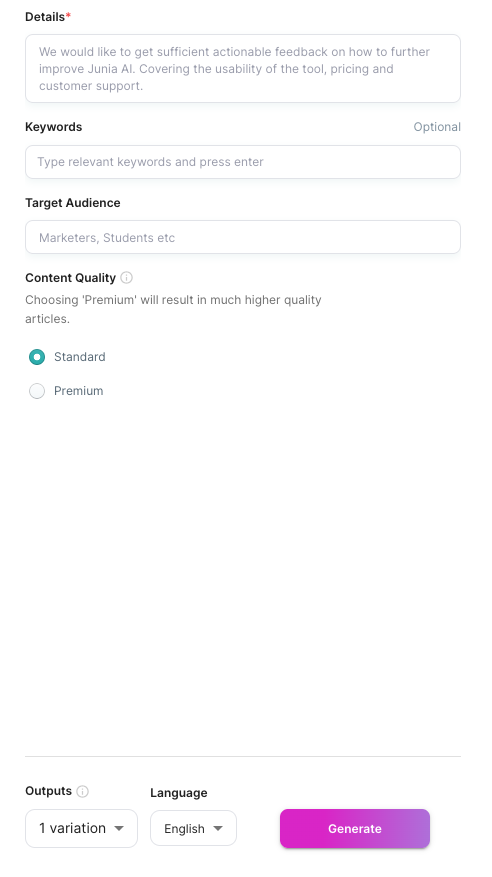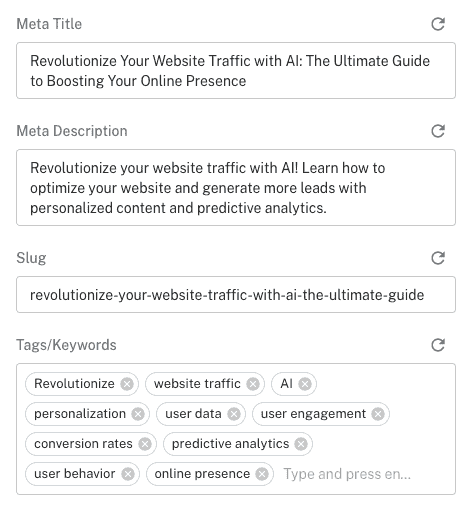Survey Questions Generator
Surveys are a valuable tool for gathering information from a large number of people. Whether you're a researcher, business owner, or part of an organization, surveys can provide valuable insights and opinions. However, the success of a survey depends on one crucial factor: asking the right questions.
Asking the right questions is crucial to ensure that the survey collects accurate and meaningful data. Poorly designed questions can result in biased responses or unclear answers, making the survey results unreliable. That's where Junia AI's Survey Questions Generator comes in.
What is the Survey Questions Generator?
The Survey Questions Generator by Junia AI is a powerful tool that uses artificial intelligence (AI) to help you create effective survey questions effortlessly. This tool utilizes advanced algorithms to generate random questions for surveys, quizzes, or even content ideas, saving you time and effort in coming up with your own questions.
Why is this tool valuable?
The value of the Survey Questions Generator lies in its ability to suggest ideas for survey questions based on factors such as your target audience and the purpose of the survey. This ensures that the questions generated are tailored to your specific needs. Whether you're conducting market research, measuring customer satisfaction, or seeking feedback from employees, this tool helps you ask the right questions to gather actionable insights.
Features and Benefits
- User-friendly interface: The Survey Questions Generator is designed to be easy to use, allowing you to navigate through the tool effortlessly.
- Customizable options: You have the flexibility to customize certain aspects of the generated questions, such as question length or topic focus.
- AI technology: The power of artificial intelligence enables the tool to analyze data patterns and generate relevant questions accordingly.
- Human expertise: While AI plays a significant role in generating questions, human expertise is also incorporated into the algorithm to ensure quality output.
- Time-saving: Instead of spending hours brainstorming and crafting survey questions from scratch, you can generate a pool of potential questions within minutes.
- Actionable insights: By asking the right questions, you increase the chances of obtaining meaningful responses that can drive informed decision-making.
How to Use the Survey Questions Generator

Using Junia AI's Survey Questions Generator is simple:
- Select your target audience: Identify the group of people you want to survey.
- Define the purpose of your survey: Determine the specific information or feedback you're seeking.
- Choose question parameters (optional): Customize certain aspects of the generated questions, such as length or topic focus.
- Generate questions: Click on the "Generate" button to generate a list of random questions based on your inputs.
- Review and refine: Take a look at the generated questions and make any necessary adjustments or edits to ensure clarity and relevance using Junia AI's AI Content Editor.
- Export or integrate: Once you're satisfied with the questions, you can export them in various formats (e.g., CSV, PDF) or integrate them directly into your preferred platform such as WordPress.
Advantages and Limitations of Automated Tools
While automated survey question generation tools like Junia AI's Survey Questions Generator offer numerous benefits, it's important to be aware of their limitations as well:
Advantages:
- Time-saving: Automated tools can significantly reduce the time and effort required to create survey questions, making them ideal for projects with tight deadlines or resource constraints.
- Diverse question ideas: These AI writing tools often generate a wide range of question ideas, helping you explore different angles and gather comprehensive feedback.
- Objective approach: By relying on algorithms, automated tools eliminate personal bias that may arise from manual question creation.
Limitations:
- Lack of context: Automated tools may not fully understand the specific context or nuances of your survey, potentially resulting in generic or irrelevant questions.
- Over-reliance on technology: While AI can be powerful, it's essential to balance its usage with human judgment and expertise to ensure the quality and relevance of questions.
- Limited creativity: Automated tools may struggle with generating creative or thought-provoking questions that go beyond basic inquiries.
Best Practices for Crafting Survey Questions
While automated tools can be a valuable resource, it's still important to have a basic understanding of survey question design principles. Here are some best practices to keep in mind:
- Be clear and concise: Use simple language and avoid jargon or complex terms that could confuse respondents.
- Focus on one idea per question: Keep your questions focused on a single topic or concept to prevent confusion.
- Avoid leading or biased language: Ensure that your questions are neutral and unbiased, allowing respondents to provide their honest opinions.
- Use appropriate response scales: Select response options that accurately capture the range of possible answers for each question.
- Pilot test your questions: Before launching your survey, conduct a small-scale pilot test to identify any potential issues or areas for improvement in your questions.
Now that we've covered the basics, let's explore different types of survey questions and when to use them!
Understanding the Role of Survey Questions
The role of survey questions is crucial in gathering accurate and meaningful insights. Understanding different types of survey questions and common biases affecting respondents' answers is essential for effective survey design.
Different Types of Survey Questions
When designing a survey, it's important to consider the type of questions that will best serve the research objectives. Here are some common question types:
1. Open-ended Questions
These allow respondents to freely express their opinions without being confined to predefined options. They are useful for capturing detailed insights and uncovering unexpected responses.
2. Closed-ended Questions
These provide predefined response options such as multiple choice, rating scales, or yes/no answers. They are efficient for quantitative analysis and easier for respondents to answer.
3. Likert Scale Questions
These measure the degree of agreement or disagreement on a symmetric agree-disagree scale. They are valuable for gauging attitudes and opinions.
4. Demographic Questions
These gather information about respondents' characteristics such as age, gender, education, and occupation. They help in segmenting and analyzing survey data.
Common Biases in Survey Responses
Respondents may exhibit biases when answering survey questions, affecting the accuracy of the data collected. Here are some common biases:
- Social Desirability Bias: Respondents may provide answers that they perceive as socially acceptable rather than reflecting their true beliefs or behaviors.
- Recall Bias: Respondents may have difficulty accurately recalling past events or experiences, leading to inaccuracies in their responses.
- Order Bias: The sequence of questions can influence how respondents answer subsequent questions.
Tips to Reduce Biases in Survey Responses
To mitigate these biases:
- Use neutral language in questions to reduce social desirability bias.
- Minimize reliance on respondent memory by asking specific and relevant questions.
- Randomize the order of questions or use skip logic in online surveys to counteract order bias.
Understanding these biases is crucial for crafting unbiased survey questions that yield reliable data.
By understanding the role of different question types and being mindful of common biases, you can enhance the effectiveness of your surveys in gathering accurate insights from respondents.
Key Features to Look for in a Survey Questions Generator Tool
When choosing a survey questions generator tool, it's important to think about the main features that will improve your survey creation process and ultimately result in more precise and meaningful findings. Here are two essential features to look for:
1. Customizability Options
A good survey questions generator should allow you to customize your questions based on your specific requirements. This means being able to:
- Choose different question types like multiple-choice, rating scales, or open-ended questions.
- Format your survey with headers, images, or other visual elements to make it more appealing and user-friendly.
- Rearrange or reorder questions to create a logical flow.
2. Real-time Feedback Mechanisms
One of the benefits of using an automated tool like a survey questions generator is getting instant feedback on your questions' quality. Look for a tool that offers real-time feedback mechanisms such as:
- Question validation: alerts you if your question is unclear or biased.
- Suggestions for improvement: provides ideas on how to make your questions better.
These features help you refine and enhance your questions right away, saving time and ensuring respondents understand them correctly.
With customizable options and real-time feedback mechanisms in a survey questions generator tool, you can simplify your survey creation process while maintaining high standards. These features empower you to create surveys that align with your research goals and target audience, resulting in accurate data and valuable insights.
Conclusion
Junia AI's Survey Questions Generator is a powerful tool that combines the efficiency of AI technology with human expertise to deliver exceptional results in creating professional surveys. Whether you are conducting market research, collecting customer feedback, or running employee satisfaction surveys, this tool can help you.
By combining the power of AI technology with human expertise, Junia AI's Survey Questions Generator delivers exceptional results in creating professional surveys.
So why not give Junia AI's Survey Questions Generator a try? Streamline your survey creation process, unlock meaningful insights, and create professional surveys with ease. Start leveraging this powerful tool today and take your survey research to new heights.
